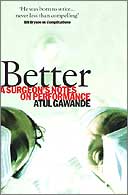
Better: A Surgeon's Notes on Performance
by Atul Gawande
Profile £12.99, pp273
Atul Gawande is a surgeon at a leading Boston hospital and an assistant professor at Harvard School of Public Health. For most people, this would probably be enough. But as the title of this book suggests, Gawande isn't interested in enough. What he wants is better.
As in his previous, bestselling book, Complications, Gawande is preoccupied with what makes the difference between getting it right, say, 99.5 per cent and 99.95 per cent of the time. This is a question that concerns anyone who takes responsibility for what he or she does, but, Gawande thinks, doctors more than most: 'Medicine's distinction is that lives are lost in those slim margins.'
In 11 essays, some of which originally appeared in the New Yorker, where he is also a staff writer, Gawande examines questions ranging from how best to manage childbirth to how to improve treatment for cystic fibrosis, from malpractice suits to whether doctors should get involved in executions. He combines anecdote, reportage, case study and reflection in prose that seems, in an Orwellian way, to be scarcely there, so clear and unarguable is his meaning.
This is all the more surprising given the unsettling complexity of the issues he is addressing. Doctors must always fight for their patients, so at what point should they acknowledge defeat? How much should they be paid? What do they owe their patients when things go wrong, as they sometimes do? Why do caesareans account for such a high percentage of births and should we troubled by that? Medical personnel can save soldiers with terrible battlefield injuries: what does this mean for individuals and are we ready, as societies, to reabsorb them?
Gawande deconstructs such questions and makes them clear without losing any of their multifaceted complexity. (He also has a degree in philosophy, politics and economics from Balliol, as if the surgery weren't enough.) He doesn't pretend to be writing other than specifically about medicine, but all his essays seem to have broader resonance: as he says, doctors' decisions and omissions are moral in nature. The way we treat our doctors, and the way they treat us, says a lot about the ethical underpinnings of our lives.
In his essay 'The Doctors of the Death Chamber', he discusses the motives of three doctors and a nurse who violate the American Medical Association's code of ethics by assisting at executions. Lethal injections can be painless and peaceful, but often are not. Prison wardens don't mix the chemicals properly, can't find a vein or struggle with the syringe. If you were the inmate, would you prefer to have a doctor managing your last moments? But the conclusion to which empathy tends has troubling implications: once doctors subvert this core principle of their ethical practice, they open themselves to wider exploitation for government purposes.
The essays in Better are grouped under three headings - 'Diligence', 'Doing Right' and 'Ingenuity'. Gawande usefully rehabilitates the slightly unfashionable notion of diligence to describe the kind of grand ambition and social organisation that can only be achieved by individuals caring and counting, paying attention and minding.
In his opening essay, 'On Washing Hands', Gawande notes, shockingly, that bacterial counts on hands range from 5,000 to five million colony-forming units per square centimetre. Using soap and following official guidelines, it is physically impossible to get effective handwashing down to below one minute per patient, which means that even at its speediest, one-third of staff time will be spent washing hands. It's not surprising that medical staff cut corners.
In Gawande's hospital, the introduction of quicker-to-use gels improved compliance rates for proper hand hygiene substantially, from around 40 per cent to 70 per cent. But this turned out to be inadequate. If 30 per cent of the time people don't wash their hands, there's plenty of space for the transmission of MRSA and VRE (vancomycin-resistant enterococcus), infection rates for which remained at the same level as before.
Making sure that everyone washes their hands, all the time, might seem an intractable problem, but in his next essay, Gawande writes about the phenomenal efforts to vaccinate children against polio across vast rural areas. In one week in 1997, 25 million children were simultaneously vaccinated in China, India, Bhutan, Pakistan, Thailand, Vietnam and Burma. This vastly ambitious plan actually required, on the ground, a great deal of gruellingly uncertain and unglamorous work. If the eradication of polio is something our civilisation achieves, he says, then it will be 'a monument to the perfection of performance'.
And this is where Better keeps leading us. Opening with the question 'what does it take to be good at something in which failure is so easy, so effortless?', Gawande concludes that it is vigilance, counting things, thinking around the edges of what you're doing, coming up with a new way of looking at the problem, caring, admitting mistakes, remaining clear-sighted, looking for improvement.
At one point, he asks: what if you turn out to be average? By definition, you probably will be. His answer seems to be that even while we know this, settling for it simply isn't on. Collective improvement, a healthcare system that works, involves every individual involved in making a diligent assessment of his or her performance, in caring about the detail and the implications. Then, in fact, it often becomes clear how to be better.

